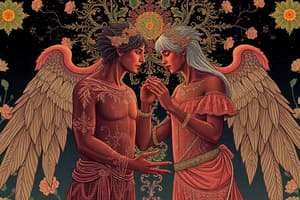Podcast
Questions and Answers
What is the primary erogenous zone during the oral stage of psychosexual development?
What is the primary erogenous zone during the oral stage of psychosexual development?
- Genitals
- Anus
- Breasts
- Mouth (correct)
During which age range does the anal stage of psychosexual development occur?
During which age range does the anal stage of psychosexual development occur?
- 2-3 years (correct)
- 1-2 years
- 0-1 years
- 4-6 years
What complex is associated with a male child's desire for his mother during the phallic stage?
What complex is associated with a male child's desire for his mother during the phallic stage?
- Electra Complex
- Penis Envy
- Castration Anxiety
- Oedipus Complex (correct)
Which fixation type is characterized by excessive cleanliness and meticulousness in the anal stage?
Which fixation type is characterized by excessive cleanliness and meticulousness in the anal stage?
What characterizes the latency stage of psychosexual development?
What characterizes the latency stage of psychosexual development?
What is a common criticism of Freud's theory of psychosexual development?
What is a common criticism of Freud's theory of psychosexual development?
In which stage does a person reach a mature capacity for love and adult sexuality?
In which stage does a person reach a mature capacity for love and adult sexuality?
Which of the following is NOT a characteristic of oral-aggressive fixation?
Which of the following is NOT a characteristic of oral-aggressive fixation?
Flashcards are hidden until you start studying
Study Notes
Psychosexual Development
- Sexual energy, or libido, is present from birth, driving psychosexual development.
- Erogenous zones are sensitive areas of the body associated with the expression of sexual energy (e.g., mouth, anus, genitals).
Oral Stage (0 - 12 months)
- Erogenous zone: Mouth, lips, and oral cavity.
- Key behaviors include sucking and biting.
- Major developmental task: Weaning.
- Fixation types:
- Oral-Passive: Overly dependent, optimistic, gullible.
- Oral-Aggressive: Hostile, sarcastic, manipulative.
Anal Stage (2-3 years)
- Erogenous zone: Anus.
- Focus on bowel movements and toilet training.
- Major developmental task: Learning control.
- Fixation types:
- Anal-Retentive: Stubborn, meticulous, rigid, overly neat.
- Anal-Expulsive: Disorganized, careless, defiant.
Phallic Stage (4-6 years)
- Erogenous zone: Genitals.
- Curiosity about gender differences and genitalia.
- Oedipus Complex: Male children experience castration anxiety due to desire for the mother.
- Electra Complex: Female children exhibit penis envy and desire for the father.
- Key task: Identification with same-sex parent, internalizing values and behaviors.
- Fixation types based on superego development:
- Men: Boastful, seeking to prove masculinity.
- Women: Flirtatious, seductive, often promiscuous.
Latency Stage (6 - Puberty)
- Sexual impulses are repressed; psychosexual development is dormant.
- Focus on friendships and social interactions.
Genital Stage (Puberty Onwards)
- Hormonal changes trigger increased sexual energy.
- Development of intimate relationships reflecting earlier childhood experiences.
- Stage culminates in a mature capacity for love and adult sexuality.
Evaluation of Freud's Theory
- Highlights psychic determinism, emphasizing unconscious drives in behavior.
- Stresses the significance of early childhood experiences in adult personality.
- Criticized for excessive focus on sexual drive.
- Lacks scientific validation.
- Possesses a postdictive nature, allowing for broad application to varied thoughts, feelings, or actions.
Studying That Suits You
Use AI to generate personalized quizzes and flashcards to suit your learning preferences.




